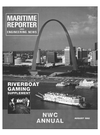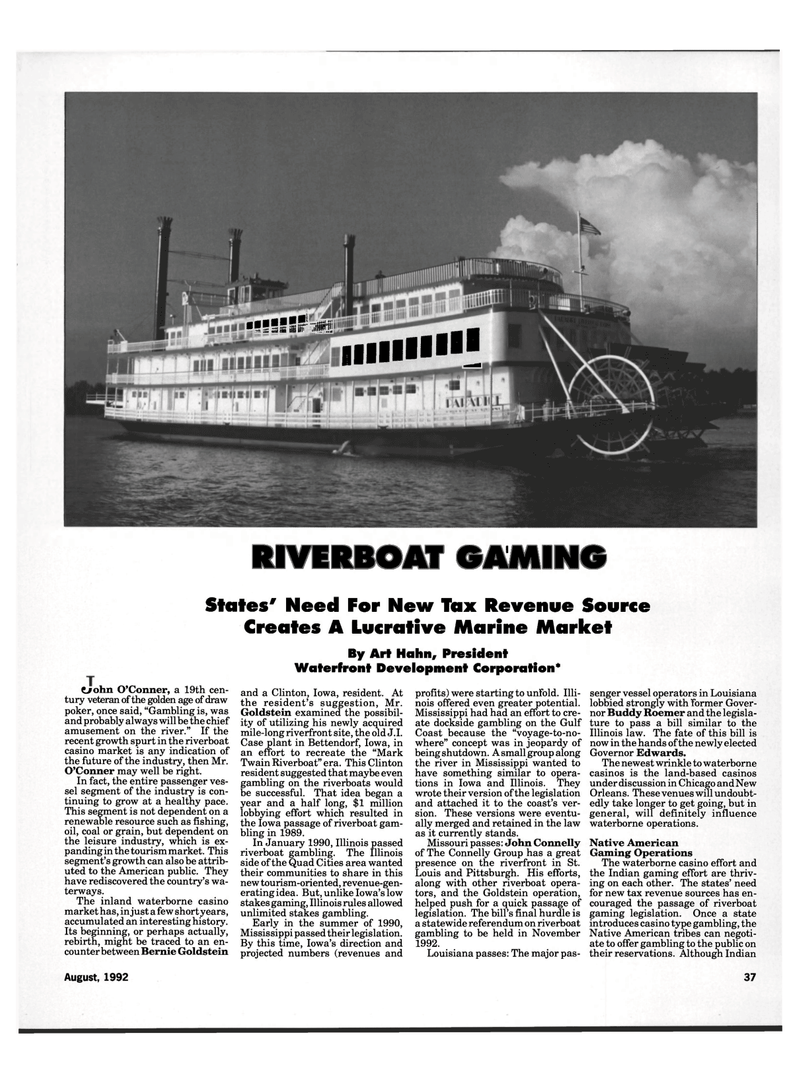
Page 35: of Maritime Reporter Magazine (August 1992)
Read this page in Pdf, Flash or Html5 edition of August 1992 Maritime Reporter Magazine
•iilSSfii:! nuiiiiil!
RIVERBOAT GAMING
States' Need For New Tax Revenue Source
Creates A Lucrative Marine Market
By Art Hahn, President
Waterfront Development Corporation* t/ohn O'Conner, a 19th cen- tury veteran of the golden age of draw poker, once said, "Gambling is, was and probably always will be the chief amusement on the river." If the recent growth spurt in the riverboat casino market is any indication of the future of the industry, then Mr.
O'Conner may well be right.
In fact, the entire passenger ves- sel segment of the industry is con- tinuing to grow at a healthy pace.
This segment is not dependent on a renewable resource such as fishing, oil, coal or grain, but dependent on the leisure industry, which is ex- panding in the tourism market. This segment's growth can also be attrib- uted to the American public. They have rediscovered the country's wa- terways.
The inland waterborne casino market has, in just a few short years, accumulated an interesting history.
Its beginning, or perhaps actually, rebirth, might be traced to an en- counter between Bernie Goldstein and a Clinton, Iowa, resident. At the resident's suggestion, Mr.
Goldstein examined the possibil- ity of utilizing his newly acquired mile-long riverfront site, the old J.I.
Case plant in Bettendorf, Iowa, in an effort to recreate the "Mark
Twain Riverboat" era. This Clinton resident suggested that maybe even gambling on the riverboats would be successful. That idea began a year and a half long, $1 million lobbying effort which resulted in the Iowa passage of riverboat gam- bling in 1989.
In January 1990, Illinois passed riverboat gambling. The Illinois side of the Quad Cities area wanted their communities to share in this new tourism-oriented, revenue-gen- erating idea. But, unlike Iowa's low stakes gaming, Illinois rules allowed unlimited stakes gambling.
Early in the summer of 1990,
Mississippi passed their legislation.
By this time, Iowa's direction and projected numbers (revenues and profits) were starting to unfold. Illi- nois offered even greater potential.
Mississippi had had an effort to cre- ate dockside gambling on the Gulf
Coast because the "voyage-to-no- where" concept was in jeopardy of being shutdown. A small group along the river in Mississippi wanted to have something similar to opera- tions in Iowa and Illinois. They wrote their version of the legislation and attached it to the coast's ver- sion. These versions were eventu- ally merged and retained in the law as it currently stands.
Missouri passes: John Connelly of The Connelly Group has a great presence on the riverfront in St.
Louis and Pittsburgh. His efforts, along with other riverboat opera- tors, and the Goldstein operation, helped push for a quick passage of legislation. The bill's final hurdle is a statewide referendum on riverboat gambling to be held in November 1992.
Louisiana passes: The major pas- senger vessel operators in Louisiana lobbied strongly with former Gover- nor Buddy Roemer and the legisla- ture to pass a bill similar to the
Illinois law. The fate of this bill is now in the hands of the newly elected
Governor Edwards.
The newest wrinkle to waterborne casinos is the land-based casinos under discussion in Chicago and New
Orleans. These venues will undoubt- edly take longer to get going, but in general, will definitely influence waterborne operations.
Native American
Gaming Operations
The waterborne casino effort and the Indian gaming effort are thriv- ing on each other. The states' need for new tax revenue sources has en- couraged the passage of riverboat gaming legislation. Once a state introduces casino type gambling, the
Native American tribes can negoti- ate to offer gambling to the public on their reservations. Although Indian
August, 1992 37

 34
34

 36
36
